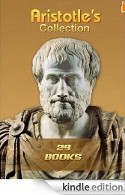FICTION
IS A THEORY
"The Theory of Fiction" tells
us the truth of what has happened, as in news, but it does
not mean it is false. People perceive that fiction is something
untrue. Fiction is about possible things in possible worlds
 |
| Aristotle's
Collection
[29 Books] |
The works of Aristotle may well have begun "The
Theories of Fiction". A good story is prescriptive
and must do this or that. How do we perceive that certain
stories are effective? Once we understanding how stories work,
this will allow us to write better stories. The Greek word
Aristotle used was "MYTHOS" or fable /
plot. Aristotle believed that all forms of poetry are essentially
a kind of fiction. A good example of this work is, Aristotle
on the Art of Fiction, "The Poetics",
translated and edited by Leonard James Potts (1968).
In the Poetics, Aristotle was concerned primarily with discussing
the epic poem and the dominant forms of drama, comedy and
tragedy. Aristotle's fiction was composed in dialogue, not
prose, and not the same as dominates our time: the novel,
novella and the short story.
The telling of stories predates speech. Sign language, wall
and animal skin drawings have been telling us tribal folklore
since the time of the cave people. The impulse to make up
characters is part of the history of all people, cultures
and countries.
With speech came oral stories and storytellers used voice
and manner in the telling of a story. The injection of voice
density into a tale's material held captive the listeners.
Fiction of the deeds of dead spirits presents extraordinary
influential power over the teller's audience.
In the writings of Jeremy Bentham's A Curious Double
Language, he claims that the theory of fiction and the
theory of fact, are inseparable aspects of the same cognitive
process. In his view, fictions create facts, which are fictions.
Bentham (1748-1832) was an English lawyer and a utilitarian
philosopher.
Another very interesting read about literary probability
and make-believe in relation to probability more broadly conceived
and theories of fictions is University of California's Professor
Robert Newsom's 1988, A Likely Story. In Newsom's work, he
provides a detailed historical account of both philosophical
and literary discussions about probability, but he also presents
a complex and persuasive theory about the logical relationships
between the fictional and the real. Newsom relates the key
to the nature of fiction is the nature of belief engineered
by fiction.
When entering the literary world of "Myth's",
it can be assumed that Myth is generally a synonym
for untrue. According to Hayden White mythical thinking takes
signs and symbols for the things they represent and takes
metaphors literally.
Hayden V. White (1928) is a Tennessee historian who is quite
famous for his work in "Metahistory" (1973),
but his essay The Burden of History (vol. 5 no.2
1966) forges into two burdens: the burden felt by the historian
who works awkwardly from the middle-spaces between the imaginative,
creative arts and the hard sciences, and the burden of history
itself bearing its conditionally drawn lessons on contemporary
thought and action.
A question to ponder is: "Do fictional beings and beings
in the real worlds reside, as they are, at different levels?"
The answer to the question would take too many pages, so if
it interests you; I suggest you read Johannes Schmitt's
Fictional Hierarchies and Modal Theories of Fiction.
Stepping away from the Western Literary World of the "Theory
of Fiction", one must respect the works of Ming
Dong Gu, an Associate Professor of Chinese Comparative Literature
and Director of the Confucius Institute at the University
of Texas.
Ming Dong Gu delivers a deeply rooted work with original
insights and provocative arguments throughout his work in
The Chinese Theories of Fiction published in 2006 by
Suny Press. Ming's theories challenge certain accepted views
of Chinese fiction and takes a fresh approach in relation
to European and world fictions.
Chinese author, Martin W. Huang, believes that many of the
arguments that Ming presents are thought provoking, compelling
the free thinker to rethink many issues in Chinese Literature,
especially the generic nature of Chinese fiction.
In conclusion, the "Theory of Fiction"
is very subjective and one should research and read in length
before forming an opinion.
Now, go softly into the night. mgf
Comments
always welcome
Email: Michael,
Behind the Fiction
|